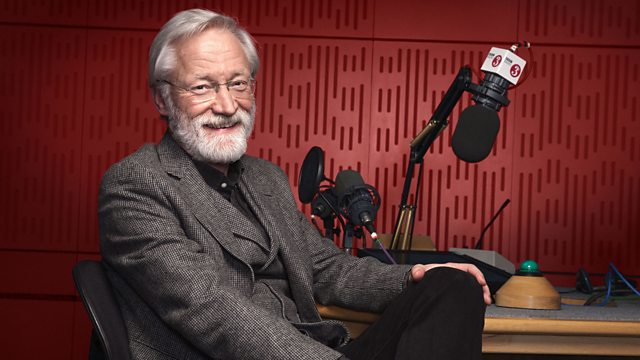Alfred Schnittke
Donald Macleod explores the strange, brilliant and occasionally nightmarish world of the Soviet composer Alfred Schnittke.
Donald Macleod explores the strange, brilliant and occasionally nightmarish world of the Soviet composer Alfred Schnittke.
The music of Alfred Schnittke (1934-1998) is like being lost in a hall of mirrors. Staring back at you is the whole of music history - from Bach to modern pop via tangos, Soviet work songs, Gregorian chant and Viennese waltzes - refracted and distorted, and woven together to create a uniquely personal style. Thrilling, grotesque, occasionally nightmarish - Schnittke creates a world where everything has a hidden meaning. Beethoven's Fifth suddenly springs terrifyingly out of the darkness in the midst of an otherwise chaotic symphony. Or a cheap Russian pop song appears inexplicably amidst a Baroque chorale. Schnittke's world of suppressed meanings perfectly captured life under the cosh of Soviet Communism. All this week, Donald Macleod unpicks the strands of a musician often seen as the heir to Shostakovich - and perhaps the last truly great composer of the 20th century.
Donald begins by exploring the connections - musical, psychological and spiritual - between Alfred Schnittke and the great titan of Soviet music, Dmitri Shostakovich. He then unravels the term "polystylism", which Schnittke himself coined to describe his fusing of wildly eclectic styles - from Bach to pop to hypermodernism to Tchaikovsky. We hear about Schnittke’s intense fame in the 1970s, and how his turn to a deeply devout musical style shocked the avant-garde and won him a whole new spectrum of admirers. Donald takes us through Schnittke’s most rollicking and significant year – 1985 – which saw the creation of five acknowledged masterpieces and the first of several crippling strokes. Seemingly, Schnittke’s mortality drove him to create ever more shattering music in his final years - to compose to the very bitter end, in the face of almost unimaginable physical challenges.
Music featured:
Concerto Grosso No 1 (arr. for flute, oboe, harpsichord, prepared piano and strings) (2nd mvt)
Violin Concerto No 1 (2nd mvt)
Piano Quintet (2nd mvt - "In Tempo Di Valse")
Violin Sonata No 1
Symphony No 1 (2nd mvt)
The Cloak (Gogol Suite)
Concerto Grosso No 3
Voices Of Nature
Schnittke, arr Boguslavsky
Suite In The Old Style
Hymn No 3, for cello, bassoon, harp, harpsichord and tubular bells
Complete This Work Which I Began (Choir Concerto - 4th mvt)
Gloria - Credo - Crucifixus (Symphony No 2 "St Florian")
O Master Of All Living (Choir Concerto - 1st mvt)
When They Beheld The Ship That Suddenly Came; If You Wish To Overcome Unending Sorrow; I Entered This Life Of Tears A Naked Infant (Psalms Of Repentance)
Moz-Art A La Haydn
Viola Concerto (1st & 2nd mvts)
Concerto Grosso No 4 / Symphony No 5 (2nd mvt)
Doctor Faustus lamented and wept...It came to pass (Faust Cantata)
Menuet, for violin, viola and 'cello
Stille Nacht
Symphony No 6 (3rd & 4th mvts)
Piano Sonata No 1
For full tracklistings, including artist and recording details, and to listen to the pieces featured in full (for 30 days after broadcast) head to the series page for Schnittke: /programmes/b0bcpr22
And you can delve into the A-Z of all the composers we’ve featured on Composer of the Week here: http://www.bbc.co.uk/programmes/articles/3cjHdZlXwL7W41XGB77X3S0/composers-a-to-z
Presenter: Donald Macleod
Producer: Steven Rajam for ����ý Wales
Podcast
-
![]()
Composer of the Week
Donald Macleod explores the life and work of composers.


